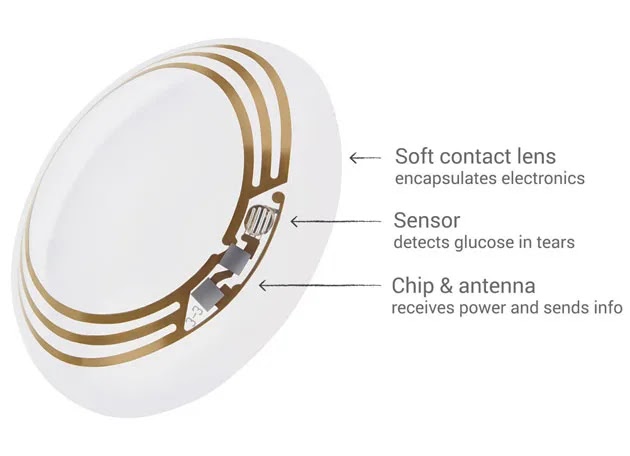Revolutionizing Tear Science: Google's Bold Move with AI-Infused Contact Lenses
The year was 2014, and New York was in the throes of the cronut craze – a hybrid of a croissant and a donut that caused lines longer than a Shakespearean soliloquy. For most, the only inconvenience was the wait, but for individuals like my dear friend Cara, living with diabetes, this culinary trend brought with it a host of additional challenges. You see, enjoying a hip baked delight in SoHo required more than just patience. It involved a meticulously choreographed dance of blood sugar measurements, carbohydrate calculations, insulin adjustments, and more finger pricking than a sewing bee on overdrive. Ah, the sweet symphony of diabetes management! But fear not, for Google has thrown its hat into the ring, or rather, onto the eye – with a contact lens that reads your glucose levels from your tears. Yes, you heard that right – Google is turning tears into data packets and glucose readings into a walk in the park.
Pause your ovation for Google momentarily; it's important to understand that the concept of glucose-monitoring contact lenses wasn't just recently cooked up. Scientists have been playing around with this idea for quite some time, akin to a child engrossed in solving a Rubik's Cube. Concepts ranged from biofuel cells powered by tears to monitoring glucose via colorful fluorescence. Google, in its quirky brilliance, took inspiration from these ideas and decided to replace the fluorescent light show with good old-fashioned LEDs – just in case you ever fancied a disco in your eyeballs. This means that down the road, people with diabetes could strut their stuff with color-changing peepers, although it's not exactly the style statement you'd associate with fashion icons or rap stars.
Now, let's talk about the real gems that Google's sparkly smart contact lenses offer. Picture this: a life without the perpetual finger pricks and glucose level guessing games. Isn't that a dream? Who wouldn't want to bypass the daily ritual of turning their fingers into pincushions and adopting a mirror-checking routine that would make Narcissus jealous? With Google's high-tech lenses, you could simply gaze into the mirror without raising an eyebrow (or eyelid) as the lens wirelessly beams your glucose readings to your phone. It's almost like having a personal diabetes assistant whispering sweet nothings into your retina.
However, before we start painting a futuristic utopia where everyone's eyes shine like disco balls and diabetes management is a breeze, let's address the elephant in the room: cost. Wearable diabetes monitoring technology hasn't exactly hit the red carpet of mainstream popularity. It's not because the concept is lacking; it's more akin to having to pay a hefty price for admission to the spectacle. And that's precisely where Google's liberating services step onto the stage.
You know, the ones that you enjoy while Google cheerfully picks up your data crumbs like an eager puppy at a picnic. This time, they're extending their data-collecting prowess to diabetes management. It's a win-win, really – you get the freedom to track your health, and Google gets enough data to make your head spin faster than a roulette wheel.
"But wait," you might interject, "why should Google even care about our glucose levels?" Ah, my curious friend, let me take you on a journey into the depths of Google's data-craving psyche. Remember Google Health? No? Well, don't feel bad – it was a bit like that forgotten New Year's resolution you made five years ago. Back in 2008, Google unveiled a platform to house your health records. The concept was as brilliant as a firework show in a starlit sky. Imagine all your medical information at your fingertips, neatly stored away in the Google vaults. But, and it's a big but, the user habits, like clicks and sign-ins, were closely tracked. It's Google – data is their daily bread and butter. However, the power to divulge your health secrets remained firmly in your grasp, at least according to their privacy policy. So, Google was left peering at only the breadcrumbs users tossed their way, which ultimately led to the project's downfall in 2012. It seems that only the tech-savvy patients and wellness aficionados were eager to parade their health records around the digital town square.
But here's where things take an intriguing turn. Google possesses a special talent for breathing new life into past endeavors that didn't quite hit the mark, infusing them with a touch of innovation. Like a phoenix rising from the ashes, Google is resuscitating its health ambitions through the backdoor – leveraging the wearable tech trend and the rising tide of wellness concerns. And diabetes, oh sweet diabetes, you're the perfect subject for this grand resurrection. With millions of individuals grappling with diabetes and its ominous precursor, prediabetes, Google has spotted a goldmine of data waiting to be tapped.
Think about it: China and India alone house more diabetics than a jazzed-up pop concert has screaming fans. Globally, diabetes is expected to become more commonplace than that one friend who's always fashionably late. If we believe the CDC's crystal ball, one in every three Americans could be wearing the diabetes badge by 2050. It's a pandemic that's knocking at our door like a persistent pizza delivery guy.
So, while Google takes its flamboyant strides into the world of health, don't be fooled – it's not just about your well-being. It's about the sweet nectar of data that they can extract from your health habits. And the best part? You're on board. In exchange for your health insights, Google offers you a world without finger pricks, where tears become magical elixirs of information. So, whether you're excited about the future of glucose-measuring contacts or you're just hoping for a more stylish diabetes management routine, Google's got its eye on you. Just remember, those tears you shed might just be Google's next treasure trove.



.jpg)
Post a Comment